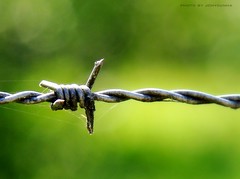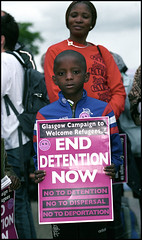 Image via Wikipedia
Image via WikipediaNew detainees arriving at Yarl's Wood immigration prison, run by outsourcing giant Serco, are being given new mobile phones locked to O2 SIM cards with the back covers glued on so that no other SIM cards can be used, Corporate Watch can reveal. The new system, criticised by campaigners for isolating, monitoring and exploiting detainees even further, follows a similar scheme introduced by G4S in Tinsley House, near Gatwick airport.
The new phone system in Yarl's Wood started last month for new arrivals, with the aim of rolling it out for “the majority of residents” by the end of October. According to Serco, there are no immediate plans to roll it out to its other detention centre, Colnbrook, near Heathrow.
A letter handed by the management to all detainees in early August 2011 stated:
“Every resident will be issued with a mobile phone on the O2 network, which has the strongest mobile phone signal of all the networks in the Yarl's Wood area ... This will be phased in over the next few weeks.”The letter adds that the phones have a “built-in SIM card and a fixed mobile telephone number”, and that O2 top-up credit “can be purchased from [the centre's] shop”.
Earlier this year, Corporate Watch revealed that G4S had contracted secure telecommunications company Global Comms and Consulting Ltd (GCC) to run a new phone system in Tinsley House, one of its Gatwick immigration prisons. Detainees were given special new phones that could be monitored and disrupted when necessary by the immigration authorities or the prison's management. Calls were also said to be more expensive and detainees were not able to call free numbers. The new contract between Serco and O2 seems to be Serco's response to G4S's trial scheme, which was expected to be rolled out to all other detention centres in the UK if “successful”.
'Best coverage'
The Yarl's Wood O2 phones come with an initial £5 free credit but detainees say this runs out “much faster than it should.” Although Serco claims that its rates are “competitive”, O2 is not the cheapest mobile network for calls within the UK or abroad, and many detainees prefer to use low-cost providers such as Lebara and Lyca. But Serco insists that the reason for choosing O2 is that it provides “the best signal coverage at Yarl's Wood”, declining to comment on whether other providers were considered before deciding on O2.































 Join our page
Join our page

